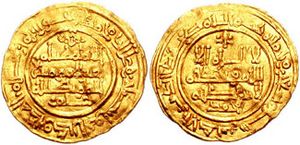Subh of Córdoba facts for kids
Quick facts for kids Subhصبح |
|||||||||
|---|---|---|---|---|---|---|---|---|---|
| Queen mother Umm walad of al-Hakam II |
|||||||||
| Born | c. 940 Kingdom of Pamplona |
||||||||
| Died | c. 999 Córdoba, Caliphate of Córdoba |
||||||||
| Burial | Córdoba, Spain | ||||||||
| Spouse | Al-Hakam II | ||||||||
| Children | Abd al-Rahman (962–970) Hisham II (966–1013) |
||||||||
|
|||||||||
Subh (Arabic: صبح, romanized: Ṣubḥ; around 940 – around 999), also known as Aurora in the Basque Country, was a very important woman in the history of al-Andalus. This was the name for parts of Spain and Portugal when they were ruled by Muslims. Subh was the wife of Caliph al-Hakam II of Córdoba (who ruled from 961–976). Later, she became the Queen mother and a powerful leader for her young son, Caliph Hisham II, who was too young to rule by himself.
Contents
Subh's Early Life and Rise to Power
Coming to the Royal Court
Subh was originally from a place called Navarre, and her first name was Aurora. She came to the royal court in Córdoba. Some people think she might have been from the Basque region of Gascony.
Becoming a Favorite in the Palace
In the Caliph's royal household in Córdoba, Subh became a favorite of Caliph al-Hakam. She was described as not only beautiful but also very smart and good at thinking things through. She knew a lot about music, poetry, and Arabic literature.
In the later years of his rule, Caliph al-Hakam became less interested in the daily tasks of running the government. It is said that he often left these important jobs to Subh. To help her with this big responsibility, she needed a secretary. In 966, a man named Al-Mansur Ibn Abi Aamir (also known as Almanzor) was chosen for this role. Almanzor became a trusted helper whom Subh relied on completely for her political work.
Subh as Queen Mother and Regent

Taking Charge for Her Son
In 976, Caliph al-Hakam died. His son, Hisham II, who was only ten years old, became the new Caliph. Because Hisham was so young, a group of people had to rule for him. This group included General Ghalib al-Nasiri, al-Mushafi (who was a chief administrator), and Subh herself. Almanzor, who had been Subh's secretary, also became important. He managed the properties that al-Hakam had left to Subh.
Subh reportedly gave Almanzor the money he needed to gain control of the army. This helped make sure that her young son, Hisham, could safely become Caliph with her as the regent (the person ruling for him). After this, she gave Almanzor a lot of power in her government. Subh also gave Almanzor the important title of hajib, which meant he was the chief of all the viziers (ministers). By 978, Almanzor had become the real ruler of Córdoba, and he started to push both Subh and Hisham to the side.
The Rise of Almanzor
A historian from the 13th century, Al-Murakushi, wrote about what happened. He said that Almanzor's importance grew after he met Sayyida Subh, Hisham's mother. Almanzor took care of her business and managed her lands, which made her very grateful. When al-Hakam died, Hisham was still young, and there was worry about problems. Almanzor helped Subh feel safe and calm, which was important for her son to be able to rule. Almanzor was very skilled, and things worked out well for him. Subh gave him the money he needed, and he was able to win over the army. This led to many events that allowed him to become even more powerful, until he was practically the only person managing the government.
Conflict and Loss of Power
Subh and Almanzor worked together very well and were close friends until about 986. However, as Almanzor's power grew and the Caliph Hisham became more isolated, Subh grew very worried. Their strong partnership began to fall apart in 996. This was because Almanzor became too ambitious, which angered Subh and her other allies.
This conflict led to Subh trying to remove Almanzor from his position. She tried to introduce other powerful men to challenge him. For two years, there was a fierce rivalry for power, which caused divisions within the government. Subh's second and final attempt to remove Almanzor in 998 did not work. Instead, it resulted in him taking complete control of all power, and this ended her time as a ruler.
See also
 In Spanish: Subh para niños
In Spanish: Subh para niños
 | Sharif Bey |
 | Hale Woodruff |
 | Richmond Barthé |
 | Purvis Young |

